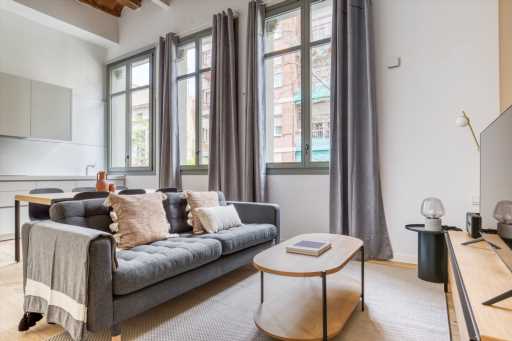Companies, hotels making remote work easier with reliable internet, coworking spaces
The digital nomad lifestyle is exhausting.
There, I said it. It’s not what you want to hear, after dreaming of pulling up anchor and working from wherever you can find a decent internet connection. With many companies extending the ability to work remotely, it’s easier than ever now — in some ways — to work while traveling the world. But figuring out where to live and how long to stay, and how to ensure you’ll have decent Wi-Fi, are topics daunting enough to make you unpack your bag (or pack the one you have and go home).
Sure, you can stay in Airbnbs, hostels and monthlong rentals, but there’s a catch: You need to plan your stay in advance. You need check-in and check-out dates. And what happens if you want to check out early and move on? Fortunately, quite a few companies have popped up to address these headaches (albeit for a premium). They attempt to offer comfortable and reliable homes for people on the move. I tried a few last year — and remain on the lookout for more. Here’s my take on these good, if imperfect, solutions.
First, there’s Landing, which is a massive network of furnished rentals in cities and suburbs across the U.S. The premise is simple: One lease gets you access to the whole network and, with some exceptions, all you need is 30 days’ notice to move to a new unit. Once you’re in, you can stay up to seven free days in available Landings elsewhere in the country every year.
I moved into a Landing unit in Denver in March 2021 with just two days’ notice and it was easily the best apartment I’d ever lived in. The furniture was beautiful and comfortable, and the company really had a knack for the finer details — it came stocked with dish soap, laundry detergent, toilet paper, snacks, candles, the whole nine.
Overall, the experience was extremely positive, even though I noticed a few of the company’s growing pains during my stay. Landing works with apartment building managers across the country. It advertises units and then furnishes them when someone bites. It’s not a perfect system: When I booked a new stay at a unit in a more walkable part of Denver, the building’s management company had already rented it. Fortunately, Landing had another unit, but my moving dates were shifted last-second. The company sent me a gift card for food delivery as an apology, and I considered us even. Later, when I requested to stay in a Landing in New York to try out my travel allowance, there were no units available. Again, Landing sent a gift card to make up for it.
I must have called the company’s leasing agents more than a dozen times in the three months I lived in Landing units, and every time I walked away feeling like I was winning, even when I’d been inconvenienced. On top of all this, Landing has monthly giveaways for members (I received a bottle of jalapeño grapefruit spirits and a houseplant). I liked the experience quite a lot.
Also while living in Denver, I gave Deskpass a spin. Sort of like an Airbnb for office space, Deskpass is a subscription service that grants you a set number of days valid across a countrywide network of co-working spaces. It also operates in Canada, Australia and the United Kingdom. You search for a space on the Deskpass app, book and show up. There’s no need to deal with day rates or multiple short-term memberships. A well-designed co-working space can provide a moment of bliss during an otherwise chaotic trip, and in my experience it’s well worth the investment to provide separation between work and fun, especially when you’re living on the road.
I also tried Blueground, which is a more global competitor to Landing. Blueground has units in several U.S. cities, including Denver, New York, Seattle and Los Angeles, as well as in London, Paris, Athens, Istanbul, Berlin, Madrid, Dubai and other locations around the globe. The concept is similar: Sign one lease and you can hop between units around the world.
I spent about three months in a Blueground apartment in London last summer (full disclosure: I received a discounted media rate) while I was looking for a solution to a tricky problem: I was thinking of staying in London for a while, but couldn’t easily get a lease for an apartment as a foreigner on a tourist visa. Blueground eliminates that red tape. Booking an apartment is more involved than booking a hotel room or Airbnb, as it involves a lease. Using Blueground, you don’t have to provide references and pay months in advance, as often is required. In London, many landlords ask you to pay for your entire stay up front if you aren’t working full time for a U.K. company. So even though it’s pricey, using a company like Blueground is a valid option for long-term stays.
Like Landing, Blueground is experiencing growing pains. For example, in Europe, the company typically works with individual owners rather than building managers, and when my air conditioning unit started leaking, Blueground had a hard time getting in touch with the owner. It took a couple of days to get the problem squared away. Blueground is expanding its network, so renters wanting to try cities around the world would do well to explore its options.
However you choose to get on the digital nomad train — or even if you simply want to try an extended stay somewhere new — you can be sure you’ll have hiccups along the way. (Ask me sometime, over a drink, to tell you the saga of a four-day power outage in a private rental apartment!). But these and other companies will make life on the road a bit easier if you’re willing and able to pay a bit more to have someone else deal with the logistics.
Subscribe to our weekly newsletter, In The Know, to get entertainment news sent straight to your inbox.
Source: Read Full Article





